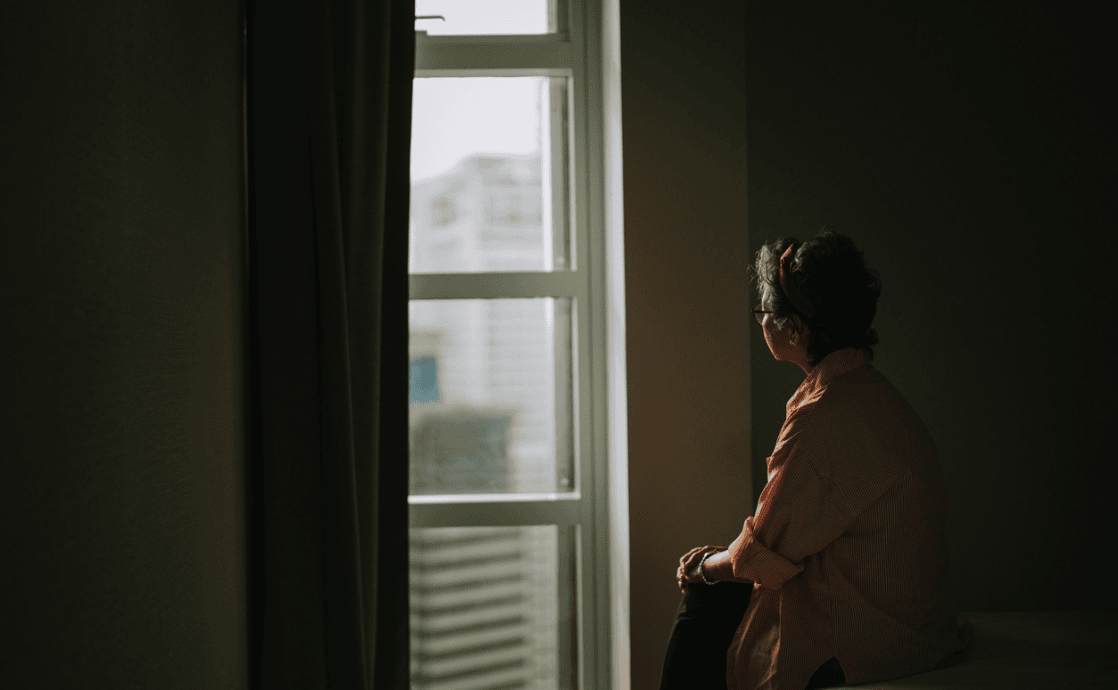The views expressed in our content reflect individual perspectives and do not represent the authoritative views of the Baha'i Faith.
When I take my occasional walks through the nursing home where I live, I always notice one of the predominant feelings produced by being in this facility and others like it: loneliness.
Commonly, when older people like me are placed in nursing homes, whether on a voluntary basis as I have done, or when they’re forced to move to these kinds of facilities by family members who can no longer take care of them, the initial feeling may be one of relief — for both the elderly and their families and caregivers.
RELATED: How Can I Stop Being Critical of Others?
I know it was for me, anyway. I didn’t want to be a burden to anyone, and here in the nursing home, I knew I’d get the round-the-clock care I needed.
These things have a predictable pattern, though. At first, at least for a while, depending on the number of family members and the distance the family and friends have to travel, frequent visits and phone calls often take place. Then, once we’re settled and the family and friends feel assured that we will be taken care of appropriately, the frequency of visits and calls may decrease, and even the time spent with the loved ones in the facility also becomes shorter.
That is when the loneliness emerges.
Other cultures may not experience this problem since their traditions mean they tend to keep their elderly close by and might not even have nursing homes to care for them.
Of course, no one can expect loved ones to be with us constantly, ignoring their and their family’s needs, putting their own lives on hold. That would be selfish of the residents of any long-term care facility.
Here’s the best advice I’ve heard on that subject from the Baha’i teachings, expressed by Abdu’l-Baha in a talk he gave in New York City in 1912:
We should all visit the sick. When they are in sorrow and suffering, it is a real help and benefit to have a friend come. Happiness is a great healer to those who are ill. In the East it is the custom to call upon the patient often and meet him individually. The people in the East show the utmost kindness and compassion to the sick and suffering. This has greater effect than the remedy itself. You must always have this thought of love and affection when you visit the ailing and afflicted.
I can tell you from personal experience that the residents here, and probably everywhere, try their best to think rationally about these issues, yet they often feel the sense of being forgotten and abandoned. I remember, when I was a hospice volunteer for a couple of years before I became ill, this particular lady — a veteran of WWII — told everyone not to forget her. She was a wonderful lady with great stories to tell about her productive life. She was cognizant of the reality of the situation, but still the sense of loneliness and the fear of being forgotten is real and human.
I’ve felt it myself. With all that keeps me busy daily, and despite sleep, which now takes a good chunk of my life, at times, loneliness still creeps in.
All of the residents know what the reality is, and we know no one can really do anything about the family situation, nor our own, but at times a sense of unreality or illogical expectation afflicts us. That is when I have to turn to my truest and closest friend, the loving and merciful Creator, and ask God for strength and purity of heart. I also ask for help with being patient rather than continuing to wonder when I can go home.
In that state, I have to, once again, repeat this comforting prayer attributed to Abdu’l-Baha:
O God! Refresh and gladden my spirit. Purify my heart. Illumine my powers. I lay all my affairs in Thy hand. Thou art my Guide and my Refuge. I will no longer be sorrowful and grieved; I will be a happy and joyful being. O God! I will no longer be full of anxiety, nor will I let trouble harass me. I will not dwell on the unpleasant things of life.
O God! Thou art more friend to me than I am to myself. I dedicate myself to Thee, O Lord.
My spirit, refreshed and gladdened, is still growing — but physically, I am gradually deteriorating. I still have a feeling of being alive and active, but my Raynaud Syndrome is getting worse, and that, according to Dr. Google, might be one of the reasons for my transient ischemic attacks becoming more frequent — which could lead to a cerebral stroke. Raynaud Syndrome, as far as I understand, means that temporarily not enough blood flows to some part of the body, and in my case, it might be a part of the brain.
RELATED: Detaching from This World and All of Its Wonders
This concerns me because if I have a stroke and don’t die from it, I will be more of a burden to others — but I say to myself, So what happens then? Once again, I commit myself to God and my fate by repeating, “I lay ALL my affairs in Thy hand.” That calms me down. and I once again become my old harassing self.
I was going to say, why bother, life is too short. However, it seems that this does not apply to me since I have lived a lot longer than I was supposed to live due to cancer that I no longer get treatment for, since the treatment is definitely worse than the disease. As I keep saying, God has an infinite sense of humor.
That realization keeps me humble, thankful, and laughing.
















Comments
Sign in or create an account
Continue with Googleor